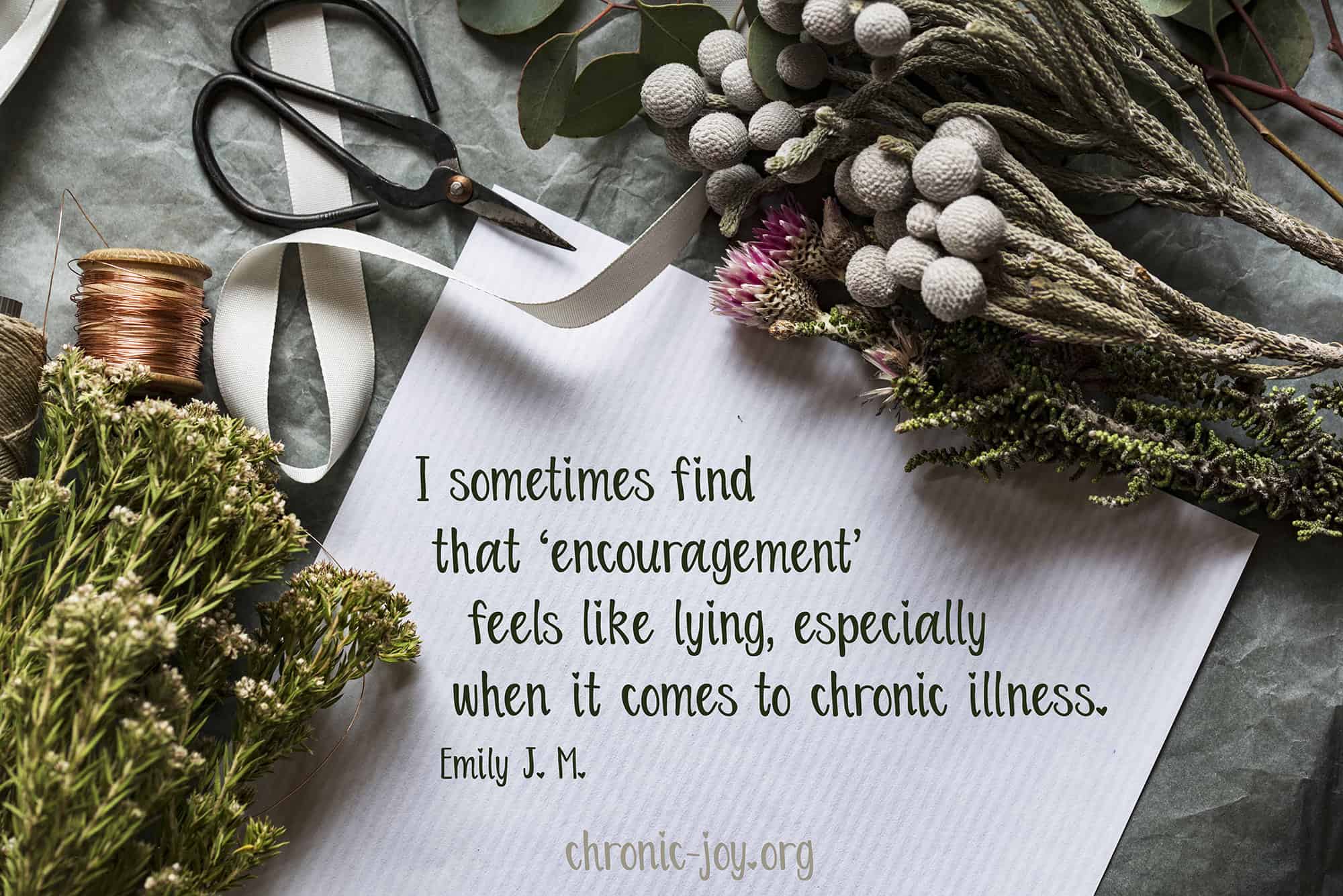
“I sometimes find that ‘encouragement’ feels like lying, especially when it comes to illness.” Emily J.M.
WHEN ENCOURAGEMENT FEELS LIKE LYING
I sometimes find that “encouragement” feels like lying, especially when it comes to chronic illness.
I want to cheer up my sick family member or struggling friend, but when I search through my “encouragement vocabulary,” the gems I unearth are phrases like:
“It’s alright.”
“It will get better.”
“God will heal you.”
“Good will come of this; just you wait.”
These comments sound nice and hopeful. They are genuinely designed to lift someone’s mood – but I often find they don’t ring true.
How can I tell my loved one, “It’s alright,” when it’s obviously not?
How can I promise them “It will get better,” or “God will heal you,” or “Good will come from this” when this might not be the case?
Is It Possible to Encourage Someone without Lying or Resorting to Cliches?
I struggle with this issue. I want to speak into someone’s dark and awful situation, but I don’t want to offer them falsehoods.
A simple way out would be to say nothing at all – but when someone you love shares part of their life, responding with silence is usually not an option.
Another response is simply, “I don’t know. I love you.” This can be powerful, effective, and true, but I believe we can do more than that.
We have been given words, and I believe using them to uplift and encourage someone with a long-term illness is possible.
Exactly how do we do that? Through much trial and error and many failed attempts, I have found these seven ways helpful in encouraging someone without lying:
Seven Ways to Encourage Someone with a Chronic Illness (Without Lying)
1. Admit That What They Say Is True
It can be encouraging to have someone affirm your words. It seems obvious and even too easy, but how often do we respond affirmatively: “That does sound awful. If I were in your place, I would feel down, too. It does sound like you don’t have much hope at the moment.”?
When we affirm someone’s story, we are not only showing them that we’ve been listening but also that we understand. We are validating their struggles and recognizing their problems are real and genuinely difficult.
2. Tell Them You Wish You Could Take It Away
Perhaps this sounds odd and even a bit obvious. I mean, of course, we don’t want them to suffer! Of course, we wish we could wave our magic wands and heal them! Yet how often do we take the time to say: “I wish there were something I could do to make you feel better. I wish you weren’t sick. I’d like to be able to take your illness away.”
When we make declarations like these, we are verbally announcing that we are on their side and that they are not alone. Their struggles are ours. We feel for them, groan with them, weep with them, and cheer with them. It is a reminder that they are deeply loved.
3. Tell Them You Love Them
Again, it sounds obvious. They should know that you love them, right? Still, when was the last time you said, “I love you.”?
This three-word phrase means a lot precisely because it can often seem unnecessary or frivolous. When we “waste” words to tell someone we love them, who knows what doubts we are setting to rest?
Social conventions may tell you it doesn’t need to be said, but why should we give in to our embarrassment when we have nothing to lose by trying?
4. Remind Them It Won’t Always Be This Way
You can’t promise someone they will get better, and you can’t know if they will get worse – but you can offer reassurance that their situation will change. “It’s awful right now, but it won’t last forever. Things will change. I can’t say whether for better or worse, but you are not stuck where you are.”
Nothing in life stays the same. This can be an immense encouragement when suffering seems eternal and time crawls by.
5. Remind Them That There Is Hope for the Future
This is not a cliche or a falsehood. If our loved one believes in Jesus, we know that life on earth is not the whole story. There is a sure and certain hope in the eternal future.
Yet, as long as life endures, there is hope for their earthly future. Who knows what tomorrow will look like? Who knows what cures, advancements, or changes in their disease will occur? “It’s so hard right now, but you are alive. This is not the end of your story. There is still hope for a cure. Hope for a miracle – if not now, then in eternity.”
When we remind someone of possibilities, we encourage them.
6. Offer Them Jesus
The best and greatest encouragement is to point someone to Jesus – but how do you do that? If you are afraid of sounding cliche or corny, simply tell the truth: “I’m sorry I can’t do anything to help you except offer you Jesus. He is good and gentle and kind. He understands and is holding you tight. He is here for you.”
7. Pray With Them
It doesn’t matter what you say. Simply sitting down with someone and bringing them before God without shame or fear is a gift. They may not remember or even believe in your prayer, but your action can encourage them.
First published at calledtowatch.com. Published with permission.


Emily J. Maurits
Chronic Joy® Contributing Writer
After working for several years in public health, Emily is studying theology. She believes we are all called to love suffering people because it is what Jesus did. She is passionate about equipping and encouraging others to do just that and founded calledtowatch.com for the family and friends of those with chronic illness. As well as uncovering God's presence in the chaos of life, she enjoys reading, running, and writing. Check out her memoir Two Sisters & a Brain Tumour.
Caregiving
Caregivers walk their own unique path through chronic illness. A caregiver's role can be rewarding and exhausting, difficult and joy-filled, meaningful and frustrating, isolating and inspiring. Wherever you are on the journey, we’re so glad you’re here! Step into hope, find purpose, embrace worth, and encounter God’s joy.


Recent Comments